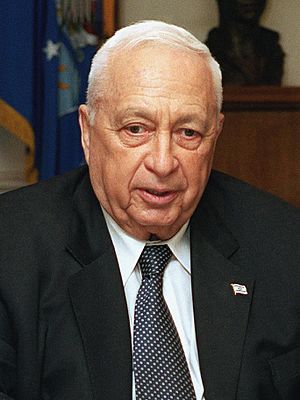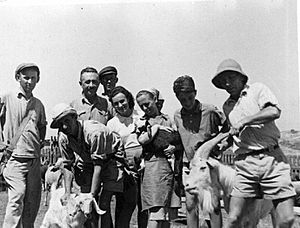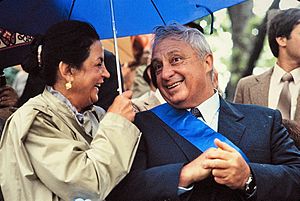Ariel Sharon facts for kids
Quick facts for kids
Ariel Sharon
|
|
|---|---|

Sharon in 2002
|
|
| 11th Prime Minister of Israel | |
| In office 7 March 2001 – 14 April 2006 |
|
| President | Moshe Katsav |
| Deputy | Ehud Olmert |
| Preceded by | Ehud Barak |
| Succeeded by | Ehud Olmert |
| Minister of Foreign Affairs | |
| In office 13 October 1998 – 6 June 1999 |
|
| Prime Minister | Benjamin Netanyahu |
| Preceded by | David Levy |
| Succeeded by | David Levy |
| Minister of Energy and Water Resources | |
| In office 8 July 1996 – 6 July 1999 |
|
| Prime Minister | Benjamin Netanyahu |
| Preceded by | Yitzhak Levy |
| Succeeded by | Eli Suissa |
| Minister of Housing and Construction | |
| In office 11 June 1990 – 13 July 1992 |
|
| Prime Minister | Yitzhak Shamir |
| Preceded by | David Levy |
| Succeeded by | Binyamin Ben-Eliezer |
| Minister of Industry, Trade and Labour | |
| In office 13 September 1984 – 20 February 1990 |
|
| Prime Minister |
|
| Preceded by | Gideon Patt |
| Succeeded by | Moshe Nissim |
| Minister of Defense | |
| In office 5 August 1981 – 14 February 1983 |
|
| Prime Minister | Menachem Begin |
| Preceded by | Menachem Begin |
| Succeeded by | Menachem Begin |
| Minister of Agriculture | |
| In office 20 June 1977 – 5 August 1981 |
|
| Prime Minister | Menachem Begin |
| Preceded by | Aharon Uzan |
| Succeeded by | Simha Erlich |
| Personal details | |
| Born |
Ariel Scheinermann
26 February 1928 Kfar Malal, Mandatory Palestine |
| Died | 11 January 2014 (aged 85) Ramat Gan, Israel |
| Political party | |
| Spouses |
Margalit Zimmerman
(m. 1953; died 1962)Lily Zimmerman
(m. 1963; died 2000) |
| Children | 3 |
| Alma mater | |
| Profession | Military officer |
| Signature |  |
| Military service | |
| Allegiance | Israel |
| Branch/service |
|
| Years of service | 1948–1974 |
| Rank | Aluf (Major general) |
| Unit |
|
| Commands |
|
| Battles/wars |
|
| n.b. | |
Ariel Sharon (born Ariel Scheinermann; 26 February 1928 – 11 January 2014) was an important Israeli leader. People often called him Arik. He was a general in the army and later became a politician. He served as the 11th Prime Minister of Israel from 2001 to 2006.
Contents
Early Life and Military Career
Ariel Sharon was born on February 26, 1928. His birthplace was Kfar Malal, a small farming village in what was then called Mandatory Palestine. His parents, Shmuel and Vera, came from Eastern Europe. They moved to Palestine in 1922. They wanted to escape the persecution of Jews in Russia.
When he was 10, Ariel joined a youth movement. As a teenager, he helped patrol his village at night. At 14, he joined the Gadna, a youth group that trained for the military. Later, he joined the Haganah, an underground Jewish defense force. This group was a early version of the Israel Defense Forces (IDF).
A Commander in the Israeli Army
Sharon became a commander in the Israeli Army in 1948. This was the year Israel was created. He fought in the 1948 Palestine war. He was a platoon commander in the Alexandroni Brigade. He took part in many battles, including Operation Bin Nun Alef.
He helped create Unit 101, a special army unit. He also played a key role in several wars. These included the 1956 Suez Crisis, the Six-Day War in 1967, and the Yom Kippur War in 1973. Another famous Israeli leader, Yitzhak Rabin, once called Sharon "the greatest field commander in our history."
Political Journey
After leaving the military, Sharon entered the world of politics. He joined the Likud party. He held many different jobs as a minister in the government.
Minister of Defense
As the Minister of Defense, he led the 1982 Lebanon War. In 1983, he had to leave his position. This was because an investigation found he did not do enough to prevent a massacre of civilians in Lebanon.
Promoting Settlements
From the 1970s to the 1990s, Sharon strongly supported building Israeli settlements. These settlements were in the West Bank and Gaza Strip.
Becoming Prime Minister
In 2000, he became the leader of the Likud party. He was then elected Prime Minister of Israel in 2001. He won against Ehud Barak.
Sharon served as Prime Minister from 2001 to 2006. This was during a period called the Al-Aqsa Intifada. As Prime Minister, he planned Israel's withdrawal from the Gaza Strip. This happened in 2004–2005. Many in his own party disagreed with this plan. So, in 2005, he left Likud. He then started a new party called Kadima.
Education and Personal Life
Sharon took a break from the military in 1950. He studied history and Middle Eastern culture. He went to the Hebrew University of Jerusalem. Later, he studied military strategy in England. He earned a law degree from Tel Aviv University in 1966.
Ariel Sharon was married twice. Both of his wives, Margalit and Lily Zimmerman, were sisters. He married Margalit in 1953. They had one son, Gur. Sadly, Margalit died in a car accident in 1962. Their son Gur died in 1967 from an accidental shooting. After Margalit's death, Sharon married her younger sister, Lily. They had two sons, Omri and Gilad. Lily Sharon passed away in 2000.
Health and Passing
Sharon had health problems, including being overweight. In December 2005, he was hospitalized. On January 4, 2006, he had a severe stroke. This caused bleeding in his brain. He fell into a coma and never woke up.
Ariel Sharon died on January 11, 2014, at the age of 85. He died from kidney failure and complications from his stroke. His funeral was held two days later. He was buried next to his wife, Lily, at his family's farm. Many leaders from Israel and other countries attended his funeral. These included Joe Biden and Tony Blair.
Legacy and Commemorations
Ariel Sharon is a very important figure in Middle East history. Many Israelis see him as a war hero. They believe he helped shape Israel's borders. However, some Palestinians view him differently. They see him as someone who worked against their hopes for their own state.
Two places in Israel are named after him:
- The Ariel Sharon Park, an environmental park near Tel Aviv.
- Camp Ariel Sharon, a large training base for the IDF in the Negev desert.
Interesting Facts About Ariel Sharon
- Sharon had an older sister named Yehudit (Dita).
- He was not a religious person.
- He spoke both Hebrew and Russian.
- In the military, he was known for being a brilliant commander. He was sometimes aggressive, but also very smart.
- A famous photo shows Sharon with a head bandage on the Suez Canal. This became a symbol of Israeli military strength.
- Stories about Sharon's love for food and his weight were well-known in Israel. He would often joke about it. His car was said to always have snacks and caviar.
Images for kids
-
Sharon, top second from left, with members of Unit 101 after Operation Egged (November 1955). Standing l to r: Lt. Meir Har-Zion, Maj. Arik Sharon, Lt. Gen Moshe Dayan, Capt. Dani Matt, Lt. Moshe Efron, Maj. Gen Asaf Simchoni; on ground, l to r: Capt. Aharon Davidi, Lt. Ya'akov Ya'akov, Capt. Raful Eitan
-
Sharon (left), armed with Ka-Bar combat knife, stands with other paratroop commandos, before Operation Olive Leaves, 1955.
-
Minister of Defense Sharon (right) with his US counterpart Caspar Weinberger, 1982
-
Sharon and Yitzhak Mordechai greeting United States President Bill Clinton in 1998
-
Sharon and President Vladimir Putin meeting in Israel.
-
Prime Minister of the Palestinian National Authority Mahmoud Abbas, United States President George W. Bush, and Ariel Sharon, Red Sea Summit, Aqaba, June 2003
See also
 In Spanish: Ariel Sharón para niños
In Spanish: Ariel Sharón para niños
 | John T. Biggers |
 | Thomas Blackshear |
 | Mark Bradford |
 | Beverly Buchanan |
















